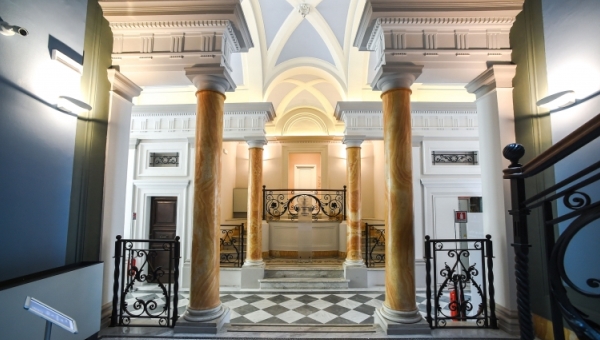Casa Scalabrini 634: Welcoming Refugees and Promoting Integration
On Wednesday, April 12th, John Cabot University’s Center for Professional & Continuing Education presented the workshop “Casa Scalabrini 634: Welcoming Refugees and Promoting Integration.” The workshop was offered as part of JCU’s Service Learning, an initiative aimed at promoting co-curricular activities for students and graduates interested in working in the humanitarian field. Casa Scalabrini 634 General Director Gioacchino Campese and JCU Alumna Marianna Occhiuto, Head of Communication and Fundraising, represented the organization, which was one of six Service Learning partners that participated in the Spring 2017 Career Fair #2. The two illustrated the mission and activities of Casa Scalabrini 634 to the participants, who also included a member of Croce Rossa Italiana, one of Service Learning’s new partners.

Casa Scalabrini 634
Campese, former Director of the House of Migrants in Tijuana, Mexico, on the border with the USA, and currently a professor at the Scalabrini International Migration Institute (SIMI), led the first part of the Workshop. He gave the audience a general introduction to the religious order behind Casa Scalabrini 634. The Scalabrinian Congregation, founded in 1887 by J. B. Scalabrini, operates in 32 countries worldwide with the mission to be “migrants among the migrants.” “As migration is an ever-changing phenomenon, where borders play a fundamental role, it is paramount to acknowledge that nowadays, some of the most controversial migration flows converge to Europe,” said Campese.
Watch Marianna Occhiuto’s video testimonial at the Spring 2017 Career Fair
The second part of the workshop featured Marianna Occhiuto, who presented the Roman program of the Scalabrinian Agency for Cooperation and Development (ASCS Onlus) and executive center of the program for “Welcoming and Inclusive Community” (programma CAI “Comunità Accogliente e Inclusiva”). Casa Scalabrini 634, formerly the Scalabrinian seminary, was created after Pope Francis’ plea to open empty religious structures to migrants, following his 2013 trip to Lampedusa, the southernmost island of Italy. The workshop was very instructive in allowing participants to understand the key differences between primary and secondary welcome. Casa Scalabrini 634 operates under the secondary welcome regime, once migrants have already obtained their “refugee” status (international political protection), exiting the SPRAR Centers. Migrants and refugees can be hosted by Casa Scalabrini 634 for up to one year, during which professionals from the organization work in collaboration with the local community to promote integration in four main areas: welcome, awareness, education, and active citizenship.
The Service Learning team is grateful to Casa Scalabrini 634 for its contribution.
Find out more about Casa Scalabrini 634 activities open to the Roman community and do not miss the chance to participate!





